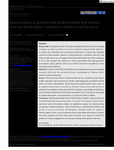Alcohol misuse in patients with alcohol‐related liver disease: How can we do better? A narrative review of the literature
| dc.contributor.author | Horrell, J | |
| dc.contributor.author | Callaghan, Lynne | |
| dc.contributor.author | Dhanda, Ashwin | |
| dc.date.accessioned | 2022-11-01T11:56:12Z | |
| dc.date.issued | 2022-08 | |
| dc.identifier.issn | 0145-6008 | |
| dc.identifier.issn | 1530-0277 | |
| dc.identifier.uri | http://hdl.handle.net/10026.1/19808 | |
| dc.description.abstract |
Background: Ongoing alcohol use is strongly associated with progressive liver damage and higher mortality in patients with alcohol- related liver disease (ArLD). Reduction in alcohol use is therefore the cornerstone of treatment to improve the long-term outcome of these patients. However, a large proportion of patients continue to use alcohol and do not access or engage with alcohol treatment services after a diagnosis of ArLD. We reviewed the literature on factors associated with ongoing alcohol consumption among patients with ArLD to identify barriers or facilitators to their accessing alcohol treatment.Methods: A search of MEDLINE and EMBASE was conducted using search strategies relating to ArLD and the psychosocial factors hypothesized to influence alcohol reduction and/or abstinence.Results: There were few relevant studies pertinent to this population group. Several studies reported a high prevalence of mental health diagnoses associated with the severity of alcohol dependence. Social and environmental factors were shown to be important determinants of alcohol use. Common themes perceived as barriers to treatment from qualitative interviews with ArLD patients across studies included poor communication between the clinical team and patient, lack of symptoms recognized by patients themselves, and perceived loss of control over their condition.Conclusions: We recommend that future clinical studies of patient cohorts with ArLD include detailed psychosocial assessments to capture information on mental health and social factors. Qualitative studies are required to explore the patient journey pre and post hospital admission, which should focus on identifying facilitators and barriers to accessing treatment. Well-designed, controlled studies are needed to identify patient, social, and environmental factors associated with relapse to alcohol use after a diagnosis of ArLD. These data will enable us to adapt our support for patients to enhance engagement with services and improve long-term outcomes. | |
| dc.format.extent | 1364-1370 | |
| dc.format.medium | Print-Electronic | |
| dc.language | en | |
| dc.language.iso | eng | |
| dc.publisher | Wiley | |
| dc.subject | alcohol use disorder | |
| dc.subject | alcohol-related liver disease | |
| dc.subject | barriers | |
| dc.subject | engagement | |
| dc.subject | psychosocial factors | |
| dc.title | Alcohol misuse in patients with alcohol‐related liver disease: How can we do better? A narrative review of the literature | |
| dc.type | journal-article | |
| dc.type | Journal Article | |
| dc.type | Review | |
| dc.type | Research Support, Non-U.S. Gov't | |
| plymouth.author-url | https://www.webofscience.com/api/gateway?GWVersion=2&SrcApp=PARTNER_APP&SrcAuth=LinksAMR&KeyUT=WOS:000822211500001&DestLinkType=FullRecord&DestApp=ALL_WOS&UsrCustomerID=11bb513d99f797142bcfeffcc58ea008 | |
| plymouth.issue | 8 | |
| plymouth.volume | 46 | |
| plymouth.publication-status | Published | |
| plymouth.journal | Alcoholism: Clinical and Experimental Research | |
| dc.identifier.doi | 10.1111/acer.14895 | |
| plymouth.organisational-group | /Plymouth | |
| plymouth.organisational-group | /Plymouth/Faculty of Health | |
| plymouth.organisational-group | /Plymouth/Faculty of Health/Peninsula Medical School | |
| plymouth.organisational-group | /Plymouth/REF 2021 Researchers by UoA | |
| plymouth.organisational-group | /Plymouth/REF 2021 Researchers by UoA/UoA01 Clinical Medicine | |
| plymouth.organisational-group | /Plymouth/REF 2021 Researchers by UoA/UoA01 Clinical Medicine/UoA01 Clinical Medicine | |
| plymouth.organisational-group | /Plymouth/REF 2021 Researchers by UoA/UoA20 Social Work and Social Policy | |
| plymouth.organisational-group | /Plymouth/Research Groups | |
| plymouth.organisational-group | /Plymouth/Research Groups/FoH - Community and Primary Care | |
| plymouth.organisational-group | /Plymouth/Research Groups/Institute of Health and Community | |
| plymouth.organisational-group | /Plymouth/Research Groups/Institute of Translational and Stratified Medicine (ITSMED) | |
| plymouth.organisational-group | /Plymouth/Research Groups/Institute of Translational and Stratified Medicine (ITSMED)/CCT&PS | |
| plymouth.organisational-group | /Plymouth/Research Groups/Plymouth Institute of Health and Care Research (PIHR) | |
| plymouth.organisational-group | /Plymouth/Users by role | |
| plymouth.organisational-group | /Plymouth/Users by role/Academics | |
| dc.publisher.place | England | |
| dcterms.dateAccepted | 2022-06-17 | |
| dc.rights.embargodate | 2022-11-2 | |
| dc.identifier.eissn | 1530-0277 | |
| rioxxterms.versionofrecord | 10.1111/acer.14895 | |
| rioxxterms.licenseref.uri | http://www.rioxx.net/licenses/all-rights-reserved | |
| rioxxterms.licenseref.startdate | 2022-08 | |
| rioxxterms.type | Journal Article/Review |


